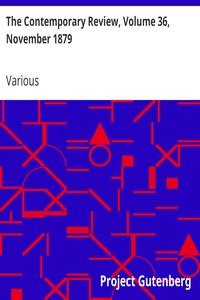|
|
Read this ebook for free! No credit card needed, absolutely nothing to pay.Words: 95248 in 14 pages
This is an ebook sharing website. You can read the uploaded ebooks for free here. No credit cards needed, nothing to pay. If you want to own a digital copy of the ebook, or want to read offline with your favorite ebook-reader, then you can choose to buy and download the ebook.

: The Contemporary Review Volume 36 November 1879 by Various - Political science Periodicals; Arts Periodicals; Literature Periodicals The Contemporary Review@FreeBooksWed 07 Jun, 2023 ON FREEDOM. Not more than twenty years have passed since John Stuart Mill sent forth his plea for Liberty. If there is one among the leaders of thought in England who, by the elevation of his character and the calm composure of his mind, deserved the so often misplaced title of Serene Highness, it was, I think, John Stuart Mill. But in his Essay "On Liberty," Mill for once becomes passionate. In presenting his Bill of Rights, in stepping forward as the champion of individual liberty, a new spirit seems to have taken possession of him. He speaks like a martyr, or the defender of martyrs. The individual human soul, with its unfathomable endowments, and its capacity of growing to something undreamt of in our philosophy, becomes in his eyes a sacred thing, and every encroachment on its world-wide domain is treated as sacrilege. Society, the arch-enemy of the rights of individuality, is represented like an evil spirit, whom it behoves every true man to resist with might and main, and whose demands, as they cannot be altogether ignored, must be reduced at all hazards to the lowest level. Is there any one here present who doubts the justice of that principle, or who would wish to reduce the freedom of the individual to a smaller measure? Whatever social tyranny may have existed twenty years ago, when it wrung that fiery protest from the lips of John Stuart Mill, can we imagine a state of society, not totally Utopian, in which the individual man need be less ashamed of his social fetters, in which he could more freely utter all his honest convictions, more boldly propound all his theories, more fearlessly agitate for their speedy realization; in which, in fact, each man can be so entirely himself as the society of England, such as it now is, such as generations of hard-thinking and hard-working Englishmen have made it, and left it as the most sacred inheritance to their sons and daughters? It may be said that some dogmas still remain in politics, in religion, and in morality; but those who defend them claim no longer any infallibility, and those who attack them, however small their minority, need fear no violence, nay, may reckon on an impartial and even sympathetic hearing, as soon as people discover in their pleadings the true ring of honest conviction and the warmth inspired by an unselfish love of truth. It has seemed strange therefore to many readers of Mill, particularly on the Continent, that this cry for Liberty, this demand for freedom for every individual to be what he is, and to develop all the germs of his nature, should have come from what is known as the freest of all countries, England. We might well understand such a cry of indignation if it had reached us from Russia; but why should English philosophers, of all others, have to protest against the tyranny of society? It is true, nevertheless, that in countries governed despotically, the individual, unless he is obnoxious to the Government, enjoys far greater freedom, or rather licence, than in a country like England, which governs itself. Russian society, for instance, is extremely indulgent. It tolerates in its rulers and statesmen a haughty defiance of the simplest rules of social propriety, and it seems amused rather than astonished or indignant at the vagaries, the frenzies, and outrages, of those who in brilliant drawing-rooms or lecture-rooms preach the doctrines of what is called Nihilism or Individualism,--viz., "that society must be regenerated by a struggle for existence and the survival of the strongest, processes which Nature has sanctioned, and which have proved successful among wild animals." If there is danger in these doctrines the Government is expected to see to it. It may place watchmen at the doors of every house and at the corner of every street, but it must not count on the better classes coming forward to enrol themselves as special constables, or even on the co-operation of public opinion which in England would annihilate that kind of Nihilism with one glance of scorn and pity. In a self-governed country like England, the resistance which society, if it likes, can oppose to the individual in the assertion of his rights, is far more compact and powerful than in Russia, or even in Germany. Even where it does not employ the arm of the law, society knows how to use that softer, but more crushing pressure, that calm, but Gorgon-like look which only the bravest and stoutest hearts know how to resist. Freethinkers, and I use that name as a title of honour for all who, like Mill, claim for every individual the fullest freedom in thought, word, or deed, compatible with the freedom of others, are apt to make one mistake. Conscious of their own honest intentions, they cannot bear to be mistrusted or slighted. They expect society to submit to their often very painful operations as a patient submits to the knife of the surgeon. That is not in human nature. The enemy of abuses is always abused by his enemies. Society will never yield one inch without resistance, and few reformers live long enough to receive the thanks of those whom they have reformed. Mill's unsolicited election to Parliament was a triumph not often shared by social reformers; it was as exceptional as Bright's admission to a seat in the Cabinet, or Stanley's appointment as Dean of Westminster. Such anomalies will happen in a country fortunately so full of anomalies as England; but, as a rule, a political reformer must not be angry if he passes through life without the title of Right Honourable; nor should a man, if he will always speak the truth, the whole truth, and nothing but the truth, be disappointed if he dies a martyr rather than a Bishop. But granting even that in Mill's time there existed some traces of social tyranny, where are they now? Look at the newspapers and the journals. Is there any theory too wild, any reform too violent, to be openly defended? Look at the drawing-rooms or the meetings of learned societies. Are not the most eccentric talkers the spoiled children of the fashionable world? When young lords begin to discuss the propriety of limiting the rights of inheritance, and young tutors are not afraid to propose curtailing the long vacation, surely we need not complain of the intolerance of English society. Whenever I state these facts to my German and French and Italian friends, who from reading Mill's Essay "On Liberty" have derived the impression that, however large an amount of political liberty England may enjoy, it enjoys but little of intellectual freedom, they are generally willing to be converted so far as London, or other great cities, are concerned. But look at your Universities, they say, the nurseries of English thought! Can you compare their mediaeval spirit, their monastic institutions, their scholastic philosophy, with the freshness and freedom of the Continental Universities? Strong as these prejudices about Oxford and Cambridge have always been, they have become still more intense since Professor Helmholtz, in an inaugural address which he delivered at his installation as Rector of the University of Berlin, lent the authority of his great name to these misconceptions. "The tutors," he says, "in the English Universities cannot deviate by a hair's-breadth from the dogmatic system of the English Church, without exposing themselves to the censure of their Archbishops and losing their pupils." In German Universities, on the contrary, we are told that the extreme conclusions of materialistic metaphysics, the boldest speculations within the sphere of Darwin's theory of evolution, may be propounded without let or hindrance, quite as much as the highest apotheosis of Papal infallibility. As to the extreme conclusions of materialistic metaphysics, there are Oxford tutors who have grappled with the systems of such giants as Hobbes, Locke, or Hume, and who are not likely to be frightened by B?chner and Vogt. Free books android app tbrJar TBR JAR Read Free books online gutenberg More posts by @FreeBooks
: Les Tourelles: Histoire des châteaux de France volume II by Gozlan L On - Castles France FR Histoire@FreeBooksWed 07 Jun, 2023

: Les Tourelles: Histoire des châteaux de France volume I by Gozlan L On - Castles France FR Histoire@FreeBooksWed 07 Jun, 2023
|
Terms of Use Stock Market News! © gutenberg.org.in2025 All Rights reserved.






